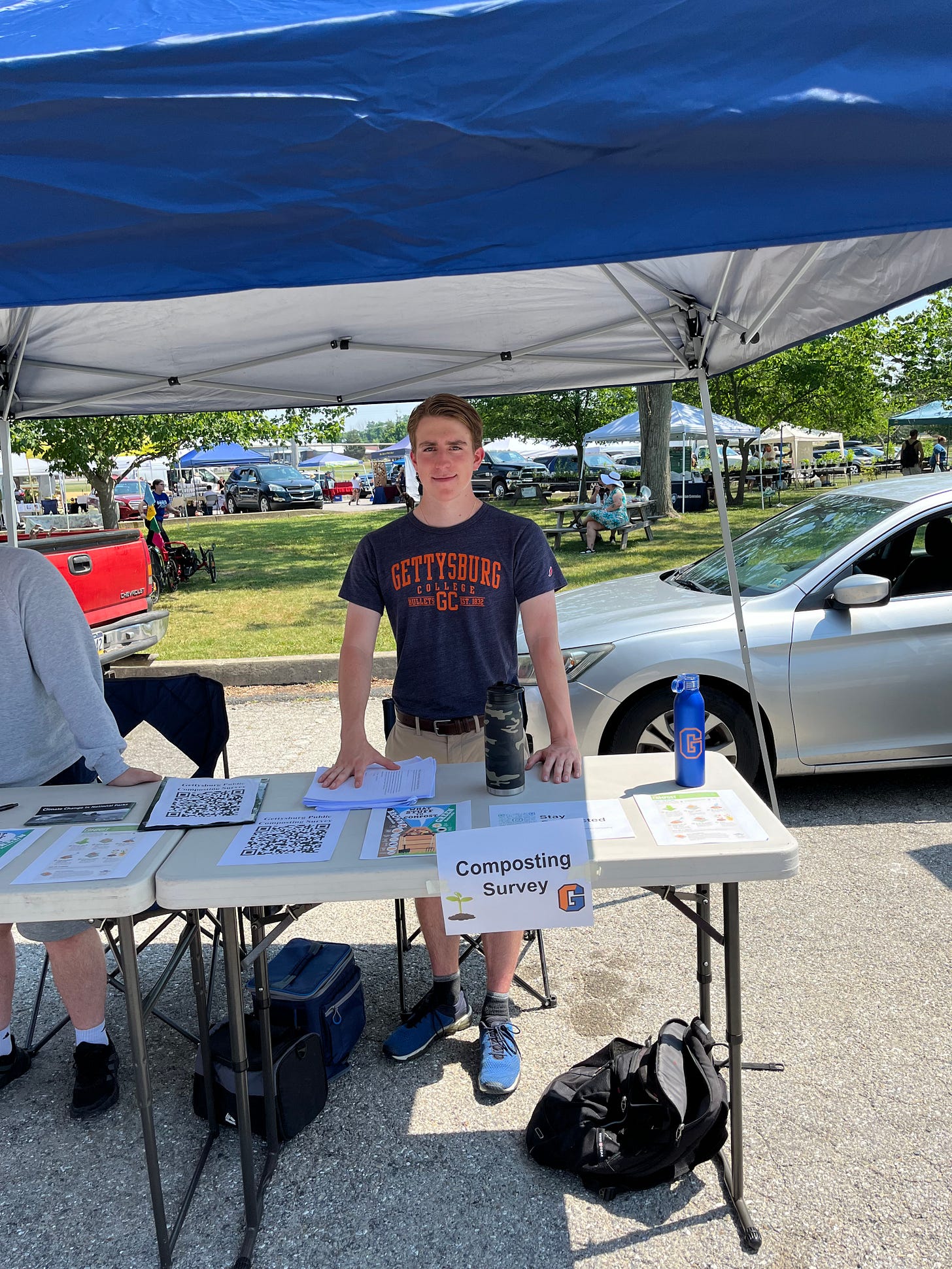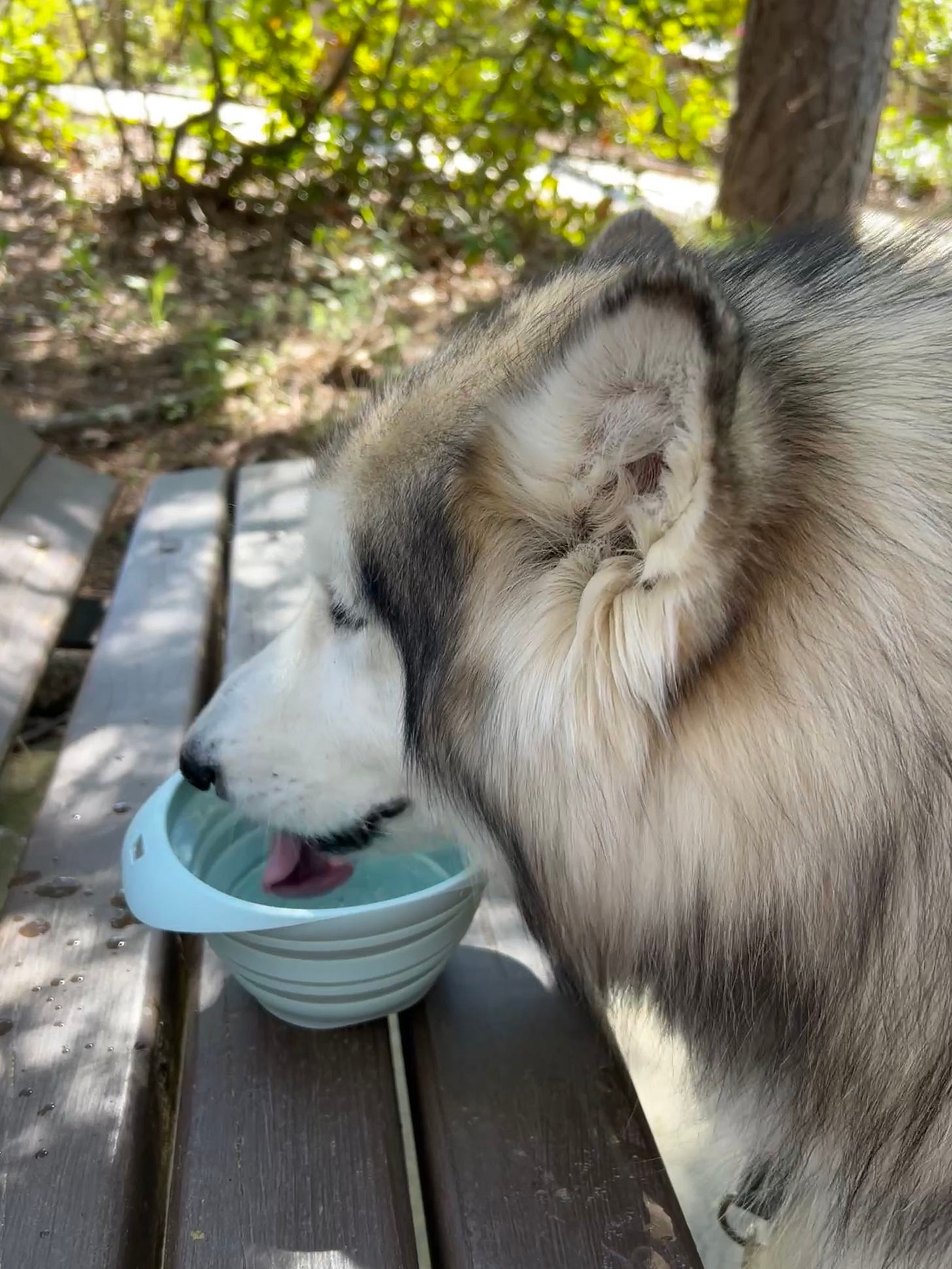He's setting a community-wide circle into motion, turning food scraps into soil
In Other News #27 // Celebrating the stories of everyday heroes among us.
Nearly 40% of all food goes to waste in the U.S.
This statistic spurred Gettysburg College student Brandon Fey into action. Over the past year, he not only organized a network of supportive community partners, but he also tapped into positive ripple effects still reverberating throughout Adams County.
In a nutshell, this is what he set into motion: a team of volunteers who collect food scraps from Gettysburg restaurants and coffee shops, deliver them to area farmers, who transform the scraps into compost and nutrient-rich soil.
“It’s something everyone can get involved in, to maximize the mutual benefits,” Fey says. “People sometimes assume this falls along a political narrative, but I’m just trying to support everyone—local farmers, small businesses and the community, while reducing waste.”
His grassroots efforts continue to evolve, into 2025. The circle is widening to include additional community partners, and the operation is taking on an official name, Scraps to Soil.
Making a name for himself
Brandon, 20, is a sophomore from Philadelphia, double majoring in history and international affairs. And community volunteerism is something he developed throughout his teens. He and his friends founded a historical society at their school, he volunteered at historical sites including Washington Crossing Historic Park, and he interned with the U.N. Association. He’s also a backyard beekeeper.
It only seems natural that his path to Gettysburg College, as a freshman and Eisenhower Scholarship awardee, would include “How Change Happens” as one of his first classes, taught by Anne Douds.
As part of the class, each student identifies a problem within society and strategizes solutions.
But Doud tells students, “I’m not going to teach you how to solve the problem. Rather, I’m going to help you figure it out, through methods and strategies. I view myself more of a coach.”
You could say Fey passed the class with flying colors. He identified a huge problem at the time: the invasion of spotted lanternflies. (For more on that project, see next week’s In Other News!)
The class “How Change Happens” also gave Fey a blueprint, as an introduction into community change. Douds isn’t at all surprised to hear he’s moved onto the next project, so to speak, outside the classroom.
“I think his passion and preparation are going to take him far, as a really impactful member of society,” Douds says.
Next, Fey applied for a capstone program affiliated with the Eisenhower Institute called Strategy & Leadership in Transformational Times (SALTT). The seminar introduces students to the concepts of strategic thinking and leadership, and also provides the opportunity to work one-on-one with Susan Eisenhower, granddaughter of President Dwight D. Eisenhower.
“Something made me think of composting,” Fey explains. “In Philadelphia, I volunteer at a local farm, and agriculture has always been one of my interests.”
His original SALTT proposal was to expand public composting in Philadelphia.
“Susan Eisenhower’s advice to me was to start smaller, maybe with Gettysburg, and I saw the potential here,” Fey says.
In the spring of 2024, he launched the project by doing market research. First, he created several surveys—for residents, farmers, restaurant owners and college students—assessing the level of interest in a community composting project. He continued gathering feedback through the summer, via a booth at the Adams County Farmers Market.
By August, he had not only learned there was a lot of interest, but enough to begin implementing a community composting project.
“One of my intentions in doing this is to reduce food waste, because it’s mostly biodegradable,” Fey explains. “When food waste is thrown out, it goes directly into landfills and creates a lot of methane which is harmful gas, so I saw this program as a good way to address a lot of things at once… supporting a community network, helping farmers and local businesses.”
Starting small
The first five restaurant partners—Sign of the Buck, Ragged Edge Coffeehouse, Bantam Coffee, Waldo’s and Cottage Crêperie—agreed to donate food scraps and coffee grounds, organic material that would otherwise go into area landfills.
“When Brandon approached me with his passion and vision for the composting project, I was immediately inspired to participate,” says Lori Mitchell, Cottage Crêperie owner.
And she had an essential composting ingredient on her hands—hundreds of eggshells.
“We use approximately 400 eggs per week during the off-season and around 1,000 per week in the busy [tourism] season,” says Mitchell, whose crepe recipe relies on a steady stream of eggs from local farms.
Compost bins were bought with a small grant Fey secured from the college. Volunteer compost collectors were trained through Adams County’s Penn State Extension Service. Several farmers welcomed the influx of compost to enrich their soil. The community circle had formed, allowing the cyclical scraps to soil process to begin.
Everything from apple cores to potato peels can be tossed into compost bins. The only produce items not compostable are citrus peels. Compost relies on nitrogen-rich green components such as vegetable and fruit scraps, along with carbon-rich brown components which include coffee filters, leaves, paper and cardboard. Everything breaks down thanks to air and microbes, turning into rich organic soil over time. It’s a cyclical process that returns produce that grew from the earth, back into soil, enriched for future crops.
The project has also nurtured Gettysburg’s community spirit, says Mitchell.
“This initiative not only brings together farmers and restaurants, but also fosters a sense of community working towards a common cause,” says Mitchell. “Brandon’s determination to bring his dream to life, along with his dedicated team, has made this collaboration a pleasure.”

Scaling up
Today, nearly a year since its inception, the project is on the verge of expansion. Fey is gearing up for more volunteers, restaurants and farms. That’s because several big partners are coming on board, including Kennie’s Market, Gettysburg.
“Kennie’s has 150 gallons of produce waste, weekly,” Fey says. “They had to use a trash compactor to fit everything into their dumpster.”
Instead, Fey bought 55-gallon trashcans with remaining grant funds, to accommodate Kennies’ waste, which will be picked up by volunteers several times a week and driven to participating farms.
Fey is also working with the college’s catering service and residence halls, to add their food scraps into the mix.
Nonprofit status is forthcoming; Fey registered the organization as Scraps to Soil, Inc.
“We don’t have a lot of operating costs, thanks to the volunteers,” says Fey. “The goal, for sustaining the project, would be household subscriptions.”
Here’s how it would work: Gettysburg households wishing to participate would pay a nominal fee to have their compost picked up on a regular basis. In return, participating restaurants would offer them discounts. It’s another circular process forming, within Scraps to Soil.
“I want this to be something that can continue and have an impact on Gettysburg,” says Fey. “Before I graduate, I want to make this as established as it can be. I don’t know exactly what my plans will be upon graduation, so I’d like it to be developed enough to hand it to a community member.”
In the meantime, he’s thinking about potentially introducing the program to his Philadelphia neighborhood this summer. But he imagines an even larger impact in the future—with lots of towns and cities replicating Scraps to Soil.
“The model,” he says, “is marketable.”
Nature Nugget
A quick travel tip and photo, sharing incredible views, trails, or parks
Last weekend, we loved visiting the Pennsylvania Grand Canyon!
Luna Lens
Sharing a photo of my fluffy floofy dog Luna… because there’s plenty of fluff to go around.
Luna visited the Pennsylvania Grand Canyon as well—and she has her own special collapsable bowl for hiking!
Comfort Corner
A great recipe, or a Spotify song. Comfort food or chill tunes. Maybe both.
Here’s an oldie but a goodie—a song that (I believe) is impossible to listen to and NOT smile, dance along, and just plain feel good. Enjoy!
Be well—have a wonderful week ahead,
Karen









Many thanks for the restock, @Maria Rodale — I’m honored! On another but important note, I’m loving your book 2/3’s of the way through!
Great sustainable way for farmers to replenish their soil without using the smelly leftovers from meat processing plants.